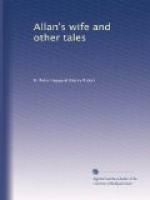She was very simply dressed in a loose blue gown, with a wide collar, and girdled in at the waist by a little leather belt. In the bosom of her robe was a bunch of orange blooms, and her rippling hair was tied in a single knot behind her shapely head. She greeted me with a smile, asking how I had slept, and then held Tota up for me to kiss. Under her loving care the child had been quite transformed. She was neatly dressed in a garment of the same blue stuff that Stella wore, her fair hair was brushed; indeed, had it not been for the sun blisters on her face and hands, one would scarcely have believed that this was the same child whom Indaba-zimbi and I had dragged for hour after hour through the burning, waterless desert.
“We must breakfast alone, Mr. Allan,” she said; “my father is so upset by your arrival that he will not get up yet. Oh, you cannot tell how thankful I am that you have come. I have been so anxious about him of late. He grows weaker and weaker; it seems to me as though the strength were ebbing away from him. Now he scarcely leaves the kraal, I have to manage everything about the farm; he does nothing but read and think.”
Just then Hendrika entered, bearing a jug of coffee in one hand and of milk in the other, which she set down upon the table, casting a look of little love at me as she did so.
“Be careful, Hendrika; you are spilling the coffee,” said Stella. “Don’t you wonder how we come to have coffee here, Mr. Allan? I will tell you—we grow it. That was my idea. Oh, I have lots of things to show you. You don’t know what we have managed to do in the time that we have been here. You see we have plenty of labour, for the people about look upon my father as their chief.”
“Yes,” I said, “but how do you get all these luxuries of civilization?” and I pointed to the books, the crockery, and the knives and forks.
“Very simply. Most of the books my father brought with him when we first trekked into the wilds; there was nearly a waggon load of them. But every few years we have sent an expedition of three waggons right down to Port Natal. The waggons are loaded with ivory and other goods, and come back with all kinds of things that been sent out from England for us. So you see, although we live in this wild place, we are not altogether cut off. We can send runners to Natal and back in three months, and the waggons get there and back in a year. The last lot arrived quite safe about three months ago. Our servants are very faithful, and some of them speak Dutch well.”
“Have you ever been with the waggons?” I asked.
“Since I was a child I have never been more than thirty miles from Babyan’s Peak,” she answered. “Do you know, Mr. Allan, that you are, with one exception, the first Englishman that I have known out of a book. I suppose that I must seem very wild and savage to you, but I have had one advantage—a good education. My father has taught me everything, and perhaps I know some things that you don’t. I can read French and German, for instance. I think that my father’s first idea was to let me run wild altogether, but he gave it up.”




